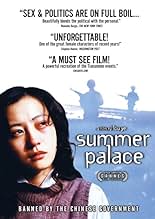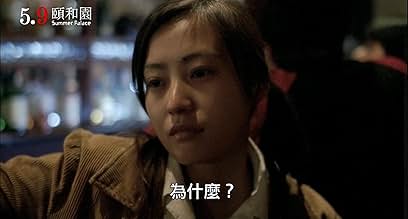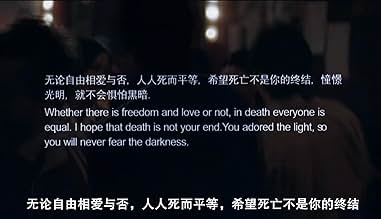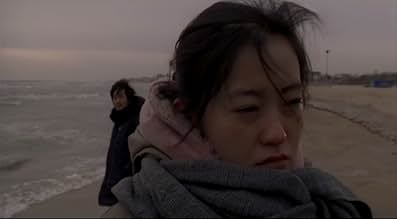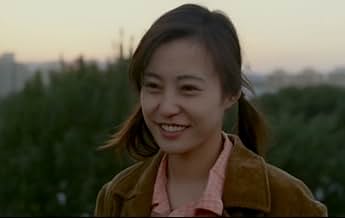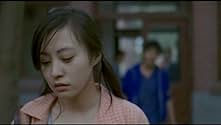IMDb RATING
7.2/10
4.9K
YOUR RATING
Yu Hong leaves her home village and starts university in Beijing, where she develops a consuming and compulsive relationship with another student. The student riots from 1989 then ensue and ... Read allYu Hong leaves her home village and starts university in Beijing, where she develops a consuming and compulsive relationship with another student. The student riots from 1989 then ensue and take a toll on their lives.Yu Hong leaves her home village and starts university in Beijing, where she develops a consuming and compulsive relationship with another student. The student riots from 1989 then ensue and take a toll on their lives.
- Awards
- 1 nomination total
- Director
- Writers
- All cast & crew
- Production, box office & more at IMDbPro
Featured reviews
Having watched the movie myself and reading some of the comments/reviews with regards to the movie prompted me to post something in fairness to the movie.
I feel that the movie was meant to let audience have a feeling that the leads in the movies are lost. If we were to think of the backdrop of the movie, set in the late 80's, Tiananmen incident, the chant for democracy, all this would have let you understand that the China then was not a China that many could understand.
The China up till the 80s was probably such a controlled and suppressed place to live in, and when these suppressed feelings and emotions were suddenly set free, it was like an explosion. The literature and external factors began influencing the way the people viewed and did things. This could explain the "mindless" love making scenes as the desires to love and to have sex were probably something that was not openly displayed or demonstrated. Freedom is what everyone wants, but the maturity to handle the consequence of the actions brought about by freedom might not be something that everyone can handle.
The movie also explores on people who dare not love. All because they fear losing it. I personally felt the characterization was done quite well, and was aptly shown by the character Yu Hong. Love is not something that can be explained logically or defined in any one way. The insight to the characters views and actions in this movie shows that clearly.
Summer Palace is a movie worth watching, but it might not be a movie that is for everyone. Keep an open mind and try and understand the time and country this movie is set in, you'd probably appreciate the movie much better that way.
I feel that the movie was meant to let audience have a feeling that the leads in the movies are lost. If we were to think of the backdrop of the movie, set in the late 80's, Tiananmen incident, the chant for democracy, all this would have let you understand that the China then was not a China that many could understand.
The China up till the 80s was probably such a controlled and suppressed place to live in, and when these suppressed feelings and emotions were suddenly set free, it was like an explosion. The literature and external factors began influencing the way the people viewed and did things. This could explain the "mindless" love making scenes as the desires to love and to have sex were probably something that was not openly displayed or demonstrated. Freedom is what everyone wants, but the maturity to handle the consequence of the actions brought about by freedom might not be something that everyone can handle.
The movie also explores on people who dare not love. All because they fear losing it. I personally felt the characterization was done quite well, and was aptly shown by the character Yu Hong. Love is not something that can be explained logically or defined in any one way. The insight to the characters views and actions in this movie shows that clearly.
Summer Palace is a movie worth watching, but it might not be a movie that is for everyone. Keep an open mind and try and understand the time and country this movie is set in, you'd probably appreciate the movie much better that way.
Whether there is freedom and love or not, in death everyone is equal. I hope that death is not your end. You adored the light, so you will never fear the darkness.
Recently, I had a sudden urge to watch the banned film "The Flowers of War" by director Lou Ye. After watching it, I still couldn't figure out why it was called that, as it has nothing to do with the Summer Palace. During the search for resources, I found both a 134-minute and a 140-minute version, and ultimately chose the latter. My mental journey during the viewing was as follows: What the heck is this? It's all about love and sex. So Lou Ye is into this? He likes to use sex to express the confusion and aimlessness of young people? I always consider myself a down-to-earth person, and I admit that I really couldn't understand what the director was trying to convey. So I will look for other materials to help me understand. I feel that Lou Ye wanted to capture the fate of individuals in the historical tide. I can sense the director's ambition, but it's really hard to understand. Without professional explanations, I admit that I really couldn't get it! Why can't the director just tell a clear story? Not everyone can understand metaphors, of course, that's the charm of art films. It's endlessly intriguing and captivating, making one want to explore further. This is the allure of the unknown, and curiosity drives us to meet. Alright, Lou Ye, you win!
Recently, I had a sudden urge to watch the banned film "The Flowers of War" by director Lou Ye. After watching it, I still couldn't figure out why it was called that, as it has nothing to do with the Summer Palace. During the search for resources, I found both a 134-minute and a 140-minute version, and ultimately chose the latter. My mental journey during the viewing was as follows: What the heck is this? It's all about love and sex. So Lou Ye is into this? He likes to use sex to express the confusion and aimlessness of young people? I always consider myself a down-to-earth person, and I admit that I really couldn't understand what the director was trying to convey. So I will look for other materials to help me understand. I feel that Lou Ye wanted to capture the fate of individuals in the historical tide. I can sense the director's ambition, but it's really hard to understand. Without professional explanations, I admit that I really couldn't get it! Why can't the director just tell a clear story? Not everyone can understand metaphors, of course, that's the charm of art films. It's endlessly intriguing and captivating, making one want to explore further. This is the allure of the unknown, and curiosity drives us to meet. Alright, Lou Ye, you win!
I thought this film was a fascinating portrait of Chinese youth and culture, as they struggle through some astoundingly turbulent times. Coming into maturity while defining love, commitment, and one's self is a challenging part of any youth's life, but all the more so as part of a society that is struggling through the same challenges itself. I found interesting analogies of the Chinese village in the character of Yu Huong, and the big city in Zhou Wei. Somewhere around college age, we all attempt to define what is important to us and explore what we can do, can be, and want. Some of that experience is sorting through our history - family, village, cultural - and deciding what we want to carry forward and embrace, and what to rebel against and discard, and I believe that this film paints a lovely, if gritty, portrayal of modern China doing just that. In their dorm rooms, in the bars and restaurants, in their homes, in their hearts. On the one hand, I would have, aesthetically, enjoyed a more sumptuous, smooth production; but that is not modern China. China (what admittedly little of it I've seen) is gritty, sweaty, crowded, noisy, straining, and that's what I see in this film.
This film caught me from the moment it started at my screen. we see a young girl encountering her first experiences with love and sex.set at the decor of the huge changes China is undergoing in the mid-eighties.She is excepted at university and meets a handsome guy she's so overpowering in love with , it's scary...wow , the acting , directing ,editing, photography...is breathtaking..the story sometimes heartbreaking..trough sidesteps we are witnessing the student uproar at tianamen square etc.the 2 main characters loose sight of each other and we follow moments of their separate lives.. A breathtaking lovestory about love so strong , it hurts. definitely worth watching.
In the late 1980's, an inexperienced young woman named Yu Hong leaves her hometown and boyfriend in the provinces to attend Beijing University. Almost immediately, she falls into a passionate love/hate relationship with a fellow student at the school. This torrid affair plays out partly against the backdrop of the student protests and subsequent massacre that occurred in Tiananmen Square in the spring of 1989. (The movie also takes place briefly in Germany, the other part of the world where significant social change was occurring in 1989).
"Summer Palace" plays almost like the autopsy of a romantic obsession, attempting to get at the root of why we love in the way that we do. A novice at true love, Yu Hong understands neither her undying passion for Zhou Wei nor her seemingly incessant need to keep sabotaging their relationship. The closest she can come to grasping this paradox is when she says to Zhou Wei: "I want to break up because I can't leave you." Love is seen almost as a form of mental illness in this film - as a debilitating, all-consuming condition that one is powerless to control or "cure" but which, if left unchecked, can become the single dominant force in a person's life (we rarely see Yu Hong studying, let alone going to class). One can attempt to fill the void with other loves, but the heart always comes back to the same place.
"Summer Palace" is long and occasionally repetitious and the political aspects aren't as effectively integrated into the story as they perhaps might have been, but the movie is beautifully acted by Lei Hao and Xiaodong Guo, among others, and features incisive and sensitive direction by Ye Lou (who, along with Feng Mei and Ma Yingli, co-authored the screenplay). This is a largely impressionistic film, concentrating more on mood, imagery and emotions than on narrative. The last hour of the film - so filled with longing and regret as the characters age and attempt to come to terms with the special thing they have lost - is particularly lyrical and heartbreaking and will haunt you long after the movie is over.
All told, "Summer Palace" is an intelligent and moving rumination on that mysterious force we call love.
"Summer Palace" plays almost like the autopsy of a romantic obsession, attempting to get at the root of why we love in the way that we do. A novice at true love, Yu Hong understands neither her undying passion for Zhou Wei nor her seemingly incessant need to keep sabotaging their relationship. The closest she can come to grasping this paradox is when she says to Zhou Wei: "I want to break up because I can't leave you." Love is seen almost as a form of mental illness in this film - as a debilitating, all-consuming condition that one is powerless to control or "cure" but which, if left unchecked, can become the single dominant force in a person's life (we rarely see Yu Hong studying, let alone going to class). One can attempt to fill the void with other loves, but the heart always comes back to the same place.
"Summer Palace" is long and occasionally repetitious and the political aspects aren't as effectively integrated into the story as they perhaps might have been, but the movie is beautifully acted by Lei Hao and Xiaodong Guo, among others, and features incisive and sensitive direction by Ye Lou (who, along with Feng Mei and Ma Yingli, co-authored the screenplay). This is a largely impressionistic film, concentrating more on mood, imagery and emotions than on narrative. The last hour of the film - so filled with longing and regret as the characters age and attempt to come to terms with the special thing they have lost - is particularly lyrical and heartbreaking and will haunt you long after the movie is over.
All told, "Summer Palace" is an intelligent and moving rumination on that mysterious force we call love.
Did you know
- TriviaIn September of 2006, director Lou Ye was barred from making movies for five years because the film incorporated footage of the Tiananmen Square demonstrations and wasn't approved by Chinese officials. The Chinese government also demanded that all copies of the film be confiscated.
- GoofsThere were no nightclubs or bars in 1980's Beijing such as the ones portrayed in Summer Palace. Despite the presence of a few underground bars in Beijing at that time, it is highly improbably that any university students would patron such establishments. Moreover, those bars did not play American pop music, did not allow dancing, did not stock western liquor, and certainly did not admit foreigners. Any clubs or bars like the ones shown in Summer Palace did not begin appearing in Beijing until the late 1990s and did not gain popularity amongst middle-class college students until after the new millennium.
- ConnectionsFeatures The 400 Blows (1959)
- SoundtracksIn Yeon
Performed by Ha Dong-jin
- How long is Summer Palace?Powered by Alexa
Details
- Release date
- Countries of origin
- Official sites
- Languages
- Also known as
- 頤和園
- Filming locations
- Production companies
- See more company credits at IMDbPro
Box office
- Budget
- $2,500,000 (estimated)
- Gross US & Canada
- $63,045
- Opening weekend US & Canada
- $8,717
- Jan 20, 2008
- Gross worldwide
- $143,027
- Runtime
- 2h 38m(158 min)
- Color
- Aspect ratio
- 1.85 : 1
Contribute to this page
Suggest an edit or add missing content


